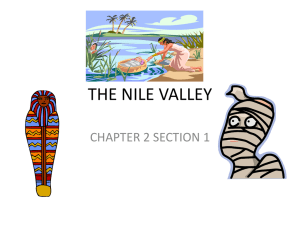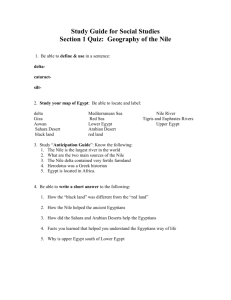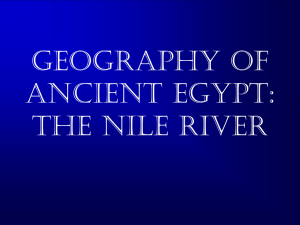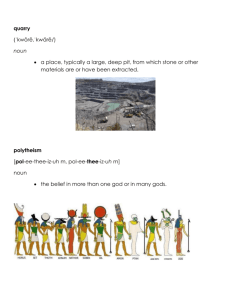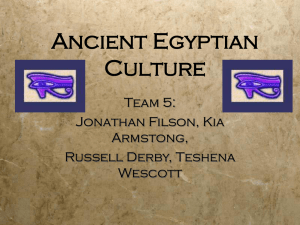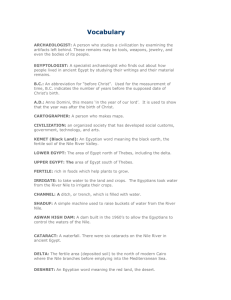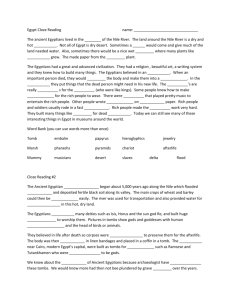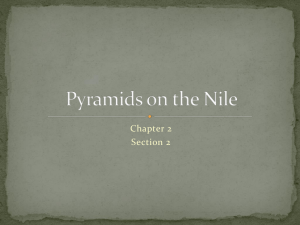6sslessonplans928
advertisement
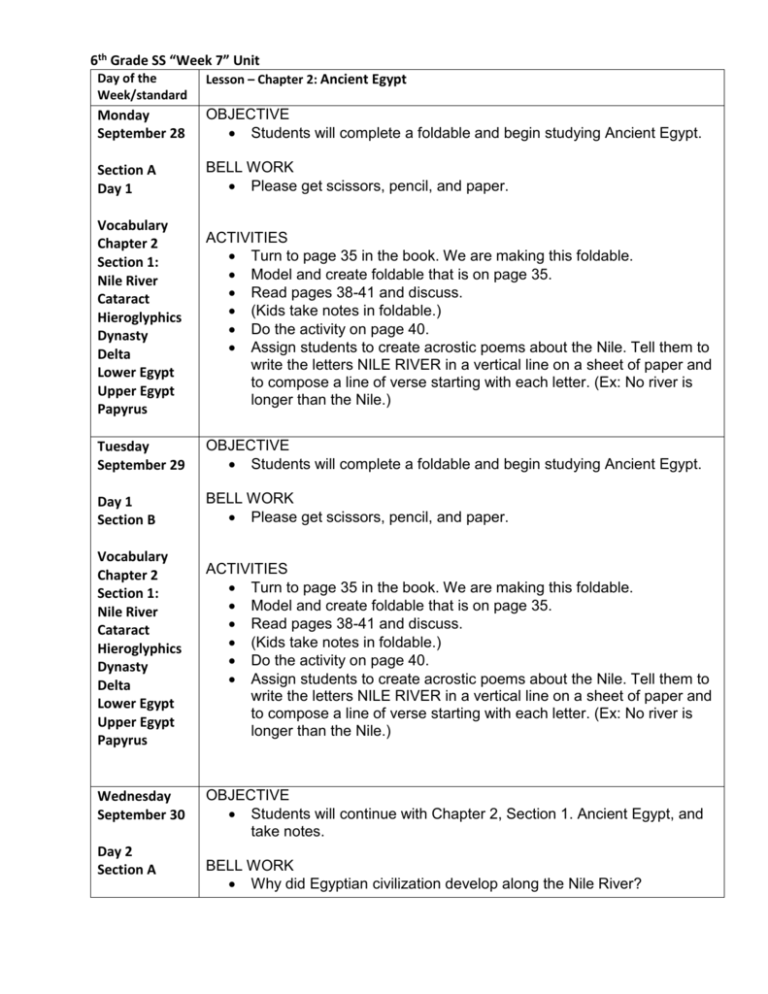
6th Grade SS “Week 7” Unit Day of the Week/standard Lesson – Chapter 2: Ancient Egypt Monday September 28 OBJECTIVE Students will complete a foldable and begin studying Ancient Egypt. Section A Day 1 BELL WORK Please get scissors, pencil, and paper. Vocabulary Chapter 2 Section 1: Nile River Cataract Hieroglyphics Dynasty Delta Lower Egypt Upper Egypt Papyrus ACTIVITIES Turn to page 35 in the book. We are making this foldable. Model and create foldable that is on page 35. Read pages 38-41 and discuss. (Kids take notes in foldable.) Do the activity on page 40. Assign students to create acrostic poems about the Nile. Tell them to write the letters NILE RIVER in a vertical line on a sheet of paper and to compose a line of verse starting with each letter. (Ex: No river is longer than the Nile.) Tuesday September 29 OBJECTIVE Students will complete a foldable and begin studying Ancient Egypt. Day 1 Section B BELL WORK Please get scissors, pencil, and paper. Vocabulary Chapter 2 Section 1: Nile River Cataract Hieroglyphics Dynasty Delta Lower Egypt Upper Egypt Papyrus ACTIVITIES Turn to page 35 in the book. We are making this foldable. Model and create foldable that is on page 35. Read pages 38-41 and discuss. (Kids take notes in foldable.) Do the activity on page 40. Assign students to create acrostic poems about the Nile. Tell them to write the letters NILE RIVER in a vertical line on a sheet of paper and to compose a line of verse starting with each letter. (Ex: No river is longer than the Nile.) Wednesday September 30 Day 2 Section A OBJECTIVE Students will continue with Chapter 2, Section 1. Ancient Egypt, and take notes. BELL WORK Why did Egyptian civilization develop along the Nile River? Vocabulary Chapter 2 Section 1 Nile River Cataract Hieroglyphics Dynasty Delta Lower Egypt Upper Egypt Papyrus Thursday October 1 Day 2 Section B Vocabulary Chapter 2 Section 1 Nile River Cataract Hieroglyphics Dynasty Delta Lower Egypt Upper Egypt Papyrus Friday October 2 Day 3 Section A Vocabulary Chapter 2 Section 1 Nile River Cataract Hieroglyphics Dynasty Delta Lower Egypt ACTIVITIES Read pages 42- 44. Do the activity at the bottom of page 44. See if any of the students can name the presidents of the US who were related. Relationships include father/son, grandfather/grandson, and cousins. (Father/son: John Adams, John Quincy Adams; George H.W. Bush and George W. Bush; grandfather/grandson: William Henry Harrison, Benjamin Harrison; Cousins: Theodore Roosevelt, Franklin Roosevelt). Recall the definition of dynasty. Ask: Would a candidate’s family relationship to a past president affect your vote? Why or why not? This is a quick write. Discuss briefly and write at least one paragraph. OBJECTIVE Students will continue with Chapter 2, Section 1. Ancient Egypt, and take notes. BELL WORK Why did Egyptian civilization develop along the Nile River? ACTIVITIES Read, discuss, and take notes over pages 42- 44. Do the activity at the bottom of page 44. See if any of the students can name the presidents of the US who were related. Relationships include father/son, grandfather/grandson, and cousins. (Father/son: John Adams, John Quincy Adams; George H.W. Bush and George W. Bush; grandfather/grandson: William Henry Harrison, Benjamin Harrison; Cousins: Theodore Roosevelt, Franklin Roosevelt). Recall the definition of dynasty. Ask: Would a candidate’s family relationship to a past president affect your vote? Why or why not? This is a quick write. Discuss briefly and write at least one paragraph OBJECTIVE Students will continue with Chapter 2, Section 2. Ancient Egypt, and take notes. BELL WORK What is a dynasty? Do we see dynasties in America today? ACTIVITIES Read, discuss, and take notes over pages 45-46. Turn to page 45. Do the cooperative learning activity. Tell students that proverbs, or wise sayings, formed an important part of ancient Egyptian life. Adults often used them to teach children. Organize the class into small groups and assign each group one of these proverbs to interpret. Have students share their proverbs and interpretations with the class. Upper Egypt Papyrus 1: Put by for a rainy day 2: For every joy there is a price to be paid 3: There grows no wheat where there is no grain 4: You do all good and destroy all evil 5: Learn politeness from the impolite Discuss. Do page 46. Do 1-3 questions. On your own. Hand in when finished.
